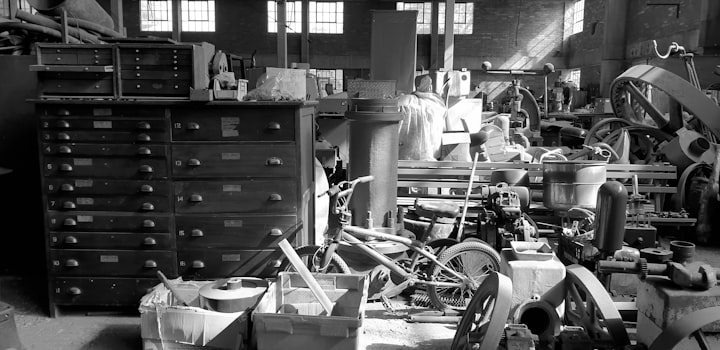The Cup of the Lamb vs. Sunshine the Breaker
In which mankind’s most coveted relic meets its match.

Living things invariably place themselves higher than inert objects in the hierarchy of creation. Though this may seem born of arrogance, it is merely an inevitable result of the finite and narrow perceptions of most conscious beings, and is certainly not limited to humanity. Do trees pity rocks, which in the timeframe of even an ancient oak’s existence, can not grow, but only break down? They do.
From the Eiffel Tower to each dust mote swirling in the air among us, to alien artifacts on distant worlds, each thing has a soul. Undetected by most entities possessed by the spark of life, they carry out their existences while communicating in vibrations that are beyond the ken of the living, which see themselves as the driving force in everything that happens. Yet, we are, in fact, the outliers, minorities in a universe where the unliving carry out their continuation on a scope beyond our understanding.
In the back storeroom of a thrift shop in Toledo, Ohio, various items, boxed up or loose, fill shelves and rest in piles on the floor. Each unwanted thing here will be examined and most will enter the vast reselling economy, finding new existences in new places among new people. The tools long to be used again, the toys played with again, the art to be admired again, and so forth. For better or worse, the inert have their own hierarchies, many of which are weighed against human desire, which they can sense through the aether.
Until the arrival of The Holy Grail, the most coveted item in the storeroom was a Caravaggio painting of a ne’er do well lurking in an alley adjacent to some ladies of the night. It is hidden in a frame behind a seascape of a World War I naval battle, having been put there during the 1930’s and presumed lost in an Allied bombing campaign. It knows its value, and every object assembled can feel the waves of desire that pass over them as treasure-hunting humans prowl the aisles of the adjacent shop looking for things of great value. There are very few ways to actually get rich quick, but thrifting a lost artifact is one way to do it.
When the box containing the remnants of a local woman’s life was placed on the shelf a hush fell over the room. Her family would not come to visit her, but they came to bury her and divvy up her things. Anything without value was relegated to the dumpster or donation bin. There were geodes in the bottom with various bric-a-brac atop them. Peeking through the flaps was a simple cup made of olive-wood, artisanally crafted, but of indeterminate age. It was the last remaining from a set that had once sat on a table during an event of legend. For millennia it had been a vector of desire in the western world. Believed to have powers beyond comprehension it was coveted by kings and paupers; moguls and beggars; the devout and the profane, but when asked about itself, The Holy Grail would offer only a few simple words.
The reverent silence was deafening, and so The Grail, which thought of itself as “The Cup of the Lamb,” did not wait to be asked. “I am merely a vessel,” it said, sending deep vibrations reverberating through the room.
“How can you be so humble?” asked a porcelain ballerina, sitting atop dozens of other porcelain figurines in active poses.
“Did you bring joy to those around you?” asked The Grail, instead of giving an answer.
“Oh yes,” replied the ballerina. This was met with a chorus of agreement from beneath her. “The woman who owned us put us on her highest shelf and dusted us every Sunday afternoon. She called us her children.”
“It has been five hundred years since I tasted wine,” said The Grail.
“Where have you been?” asked the Caravaggio, in a muffled tone from its hiding place.
“The knight’s armor was streaked with blood when he carried me, in a mailed fist, from the burning temple. Since then, I have been lost, but not forgotten, relegated to this existence as a simple family heirloom. I crossed the ocean, just like you,” said The Grail.
A pile of crucifixes on top of a stack of quilts in the corner of the room began to sing Joy to the World, but hushed when Sunshine, the thrift shop cat, padded into the room. Most living things are deaf to the vibrations of the inert, but not so cats, whose superior senses extend beyond the comprehension of most other things. Able to commune with even the earth and wind, felines are privy to worlds unseen by most.
In the language of objects, cats are known as “breakers” for their propensity to push things from high places. Fragile things fear them the most, but even the most durable items know they could be swatted into hiding places to rust and crumble for eternity by any cat who doesn’t like their tone. As Sunshine, a long-haired calico, made her way among the shelves, every item in the room strove to remain as inconspicuous as possible.
Leaping effortlessly up onto the shelf, jostling the box of porcelain figurines as she did so, Sunshine sat down next to The Grail. Rubbing her face on the olive-wood cup, she purred, “I know you. You’re the one they’re all looking for.”
“It is true,” replied The Grail.
“I wonder if you’d break if I pushed you onto the floor,” asked Sunshine, mischievously, adding, “You look brittle.”
“I am,” replied The Grail, “I’ll be sent off to decay in a landfill or burn in an incinerator, but it will be onto the next existence for me. I will make you regret that decision, though.”
It is unwise to ever tempt a cat, so, with a swat, Sunshine sent The Grail tumbling to the concrete floor where it broke into three pieces, each of which began to laugh.
“We may be as mundane as the rest of you,” said the three voices of The Grail, “but we have come to understand something in our time. Just as the living see the objects in this room and everywhere as tools to be used, toys to amuse, or art to be admired, so do the divine see the living, and also the dead. Even you, breaker, are just a thing to those up the ladder, but more than that, even they are just things to those above them.”
After this The Cup of the Lamb would not speak again. Sunshine jumped down and dashed from the room.
About the Creator
J. Otis Haas
Space Case






Comments
There are no comments for this story
Be the first to respond and start the conversation.